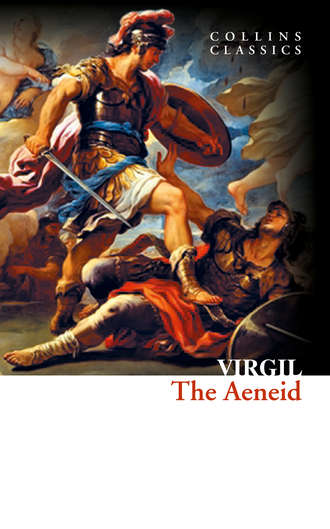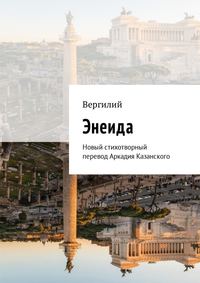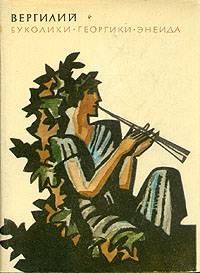
Полная версия
The Aeneid
A guard of Grecians had possess’d the porch;
There Phoenix and Ulysses watch prey,
And thither all the wealth of Troy convey:
The spoils which they from ransack’d houses brought,
And golden bowls from burning altars caught,
The tables of the gods, the purple vests,
The people’s treasure, and the pomp of priests.
A rank of wretched youths, with pinion’d hands,
And captive matrons, in long order stands.
Then, with ungovern’d madness, I proclaim,
Thro’ all the silent street, Creusa’s name:
Creusa still I call; at length she hears,
And sudden thro’ the shades of night appears—
Appears, no more Creusa, nor my wife,
But a pale specter, larger than the life.
Aghast, astonish’d, and struck dumb with fear,
I stood; like bristles rose my stiffen’d hair.
Then thus the ghost began to soothe my grief
‘Nor tears, nor cries, can give the dead relief.
Desist, my much-lov’d lord,’t indulge your pain;
You bear no more than what the gods ordain.
My fates permit me not from hence to fly;
Nor he, the great controller of the sky.
Long wand’ring ways for you the pow’rs decree;
On land hard labors, and a length of sea.
Then, after many painful years are past,
On Latium’s happy shore you shall be cast,
Where gentle Tiber from his bed beholds
The flow’ry meadows, and the feeding folds.
There end your toils; and there your fates provide
A quiet kingdom, and a royal bride:
There fortune shall the Trojan line restore,
And you for lost Creusa weep no more.
Fear not that I shall watch, with servile shame,
Th’ imperious looks of some proud Grecian dame;
Or, stooping to the victor’s lust, disgrace
My goddess mother, or my royal race.
And now, farewell! The parent of the gods
Restrains my fleeting soul in her abodes:
I trust our common issue to your care.’
She said, and gliding pass’d unseen in air.
I strove to speak: but horror tied my tongue;
And thrice about her neck my arms I flung,
And, thrice deceiv’d, on vain embraces hung.
Light as an empty dream at break of day,
Or as a blast of wind, she rush’d away.
“Thus having pass’d the night in fruitless pain,
I to my longing friends return again,
Amaz’d th’ augmented number to behold,
Of men and matrons mix’d, of young and old;
A wretched exil’d crew together brought,
With arms appointed, and with treasure fraught,
Resolv’d, and willing, under my command,
To run all hazards both of sea and land.
The Morn began, from Ida, to display
Her rosy cheeks; and Phosphor led the day:
Before the gates the Grecians took their post,
And all pretense of late relief was lost.
I yield to Fate, unwillingly retire,
And, loaded, up the hill convey my sire.”
BOOK III
“When Heav’n had overturn’d the Trojan state
And Priam’s throne, by too severe a fate;
When ruin’d Troy became the Grecians’ prey,
And Ilium’s lofty tow’rs in ashes lay;
Warn’d by celestial omens, we retreat,
To seek in foreign lands a happier seat.
Near old Antandros, and at Ida’s foot,
The timber of the sacred groves we cut,
And build our fleet; uncertain yet to find
What place the gods for our repose assign’d.
Friends daily flock; and scarce the kindly spring
Began to clothe the ground, and birds to sing,
When old Anchises summon’d all to sea:
The crew my father and the Fates obey.
With sighs and tears I leave my native shore,
And empty fields, where Ilium stood before.
My sire, my son, our less and greater gods,
All sail at once, and cleave the briny floods.
“Against our coast appears a spacious land,
Which once the fierce Lycurgus did command,
(Thracia the name—the people bold in war;
Vast are their fields, and tillage is their care,)
A hospitable realm while Fate was kind,
With Troy in friendship and religion join’d.
I land; with luckless omens then adore
Their gods, and draw a line along the shore;
I lay the deep foundations of a wall,
And Aenos, nam’d from me, the city call.
To Dionaean Venus vows are paid,
And all the pow’rs that rising labors aid;
A bull on Jove’s imperial altar laid.
Not far, a rising hillock stood in view;
Sharp myrtles on the sides, and cornels grew.
There, while I went to crop the sylvan scenes,
And shade our altar with their leafy greens,
I pull’d a plant—with horror I relate
A prodigy so strange and full of fate.
The rooted fibers rose, and from the wound
Black bloody drops distill’d upon the ground.
Mute and amaz’d, my hair with terror stood;
Fear shrunk my sinews, and congeal’d my blood.
Mann’d once again, another plant I try:
That other gush’d with the same sanguine dye.
Then, fearing guilt for some offense unknown,
With pray’rs and vows the Dryads I atone,
With all the sisters of the woods, and most
The God of Arms, who rules the Thracian coast,
That they, or he, these omens would avert,
Release our fears, and better signs impart.
Clear’d, as I thought, and fully fix’d at length
To learn the cause, I tugged with all my strength:
I bent my knees against the ground; once more
The violated myrtle ran with gore.
Scarce dare I tell the sequel: from the womb
Of wounded earth, and caverns of the tomb,
A groan, as of a troubled ghost, renew’d
My fright, and then these dreadful words ensued:
‘Why dost thou thus my buried body rend?
O spare the corpse of thy unhappy friend!
Spare to pollute thy pious hands with blood:
The tears distil not from the wounded wood;
But ev’ry drop this living tree contains
Is kindred blood, and ran in Trojan veins.
O fly from this unhospitable shore,
Warn’d by my fate; for I am Polydore!
Here loads of lances, in my blood embrued,
Again shoot upward, by my blood renew’d.’
“My falt’ring tongue and shiv’ring limbs declare
My horror, and in bristles rose my hair.
When Troy with Grecian arms was closely pent,
Old Priam, fearful of the war’s event,
This hapless Polydore to Thracia sent:
Loaded with gold, he sent his darling, far
From noise and tumults, and destructive war,
Committed to the faithless tyrant’s care;
Who, when he saw the pow’r of Troy decline,
Forsook the weaker, with the strong to join;
Broke ev’ry bond of nature and of truth,
And murder’d, for his wealth, the royal youth.
O sacred hunger of pernicious gold!
What bands of faith can impious lucre hold?
Now, when my soul had shaken off her fears,
I call my father and the Trojan peers;
Relate the prodigies of Heav’n, require
What he commands, and their advice desire.
All vote to leave that execrable shore,
Polluted with the blood of Polydore;
But, ere we sail, his fun’ral rites prepare,
Then, to his ghost, a tomb and altars rear.
In mournful pomp the matrons walk the round,
With baleful cypress and blue fillets crown’d,
With eyes dejected, and with hair unbound.
Then bowls of tepid milk and blood we pour,
And thrice invoke the soul of Polydore.
“Now, when the raging storms no longer reign,
But southern gales invite us to the main,
We launch our vessels, with a prosp’rous wind,
And leave the cities and the shores behind.
“An island in th’ Aegaean main appears;
Neptune and wat’ry Doris claim it theirs.
It floated once, till Phoebus fix’d the sides
To rooted earth, and now it braves the tides.
Here, borne by friendly winds, we come ashore,
With needful ease our weary limbs restore,
And the Sun’s temple and his town adore.
“Anius, the priest and king, with laurel crown’d,
His hoary locks with purple fillets bound,
Who saw my sire the Delian shore ascend,
Came forth with eager haste to meet his friend;
Invites him to his palace; and, in sign
Of ancient love, their plighted hands they join.
Then to the temple of the god I went,
And thus, before the shrine, my vows present:
‘Give, O Thymbraeus, give a resting place
To the sad relics of the Trojan race;
A seat secure, a region of their own,
A lasting empire, and a happier town.
Where shall we fix? where shall our labors end?
Whom shall we follow, and what fate attend?
Let not my pray’rs a doubtful answer find;
But in clear auguries unveil thy mind.’
Scarce had I said: he shook the holy ground,
The laurels, and the lofty hills around;
And from the tripos rush’d a bellowing sound.
Prostrate we fell; confess’d the present god,
Who gave this answer from his dark abode:
‘Undaunted youths, go, seek that mother earth
From which your ancestors derive their birth.
The soil that sent you forth, her ancient race
In her old bosom shall again embrace.
Thro’ the wide world th’ Aeneian house shall reign,
And children’s children shall the crown sustain.’
Thus Phoebus did our future fates disclose:
A mighty tumult, mix’d with joy, arose.
“All are concern’d to know what place the god
Assign’d, and where determin’d our abode.
My father, long revolving in his mind
The race and lineage of the Trojan kind,
Thus answer’d their demands: ‘Ye princes, hear
Your pleasing fortune, and dispel your fear.
The fruitful isle of Crete, well known to fame,
Sacred of old to Jove’s imperial name,
In the mid ocean lies, with large command,
And on its plains a hundred cities stand.
Another Ida rises there, and we
From thence derive our Trojan ancestry.
From thence, as ’tis divulg’d by certain fame,
To the Rhoetean shores old Teucrus came;
There fix’d, and there the seat of empire chose,
Ere Ilium and the Trojan tow’rs arose.
In humble vales they built their soft abodes,
Till Cybele, the mother of the gods,
With tinkling cymbals charm’d th’ Idaean woods,
She secret rites and ceremonies taught,
And to the yoke the savage lions brought.
Let us the land which Heav’n appoints, explore;
Appease the winds, and seek the Gnossian shore.
If Jove assists the passage of our fleet,
The third propitious dawn discovers Crete.’
Thus having said, the sacrifices, laid
On smoking altars, to the gods he paid:
A bull, to Neptune an oblation due,
Another bull to bright Apollo slew;
A milk-white ewe, the western winds to please,
And one coal-black, to calm the stormy seas.
Ere this, a flying rumor had been spread
That fierce Idomeneus from Crete was fled,
Expell’d and exil’d; that the coast was free
From foreign or domestic enemy.
“We leave the Delian ports, and put to sea;
By Naxos, fam’d for vintage, make our way;
Then green Donysa pass; and sail in sight
Of Paros’ isle, with marble quarries white.
We pass the scatter’d isles of Cyclades,
That, scarce distinguish’d, seem to stud the seas.
The shouts of sailors double near the shores;
They stretch their canvas, and they ply their oars.
‘All hands aloft! for Crete! for Crete!’ they cry,
And swiftly thro’ the foamy billows fly.
Full on the promis’d land at length we bore,
With joy descending on the Cretan shore.
With eager haste a rising town I frame,
Which from the Trojan Pergamus I name:
The name itself was grateful; I exhort
To found their houses, and erect a fort.
Our ships are haul’d upon the yellow strand;
The youth begin to till the labor’d land;
And I myself new marriages promote,
Give laws, and dwellings I divide by lot;
When rising vapors choke the wholesome air,
And blasts of noisome winds corrupt the year;
The trees devouring caterpillars burn;
Parch’d was the grass, and blighted was the corn:
Nor ’scape the beasts; for Sirius, from on high,
With pestilential heat infects the sky:
My men—some fall, the rest in fevers fry.
Again my father bids me seek the shore
Of sacred Delos, and the god implore,
To learn what end of woes we might expect,
And to what clime our weary course direct.
“’Twas night, when ev’ry creature, void of cares,
The common gift of balmy slumber shares:
The statues of my gods (for such they seem’d),
Those gods whom I from flaming Troy redeem’d,
Before me stood, majestically bright,
Full in the beams of Phoebe’s ent’ring light.
Then thus they spoke, and eas’d my troubled mind:
‘What from the Delian god thou go’st to find,
He tells thee here, and sends us to relate.
Those pow’rs are we, companions of thy fate,
Who from the burning town by thee were brought,
Thy fortune follow’d, and thy safety wrought.
Thro’ seas and lands as we thy steps attend,
So shall our care thy glorious race befriend.
An ample realm for thee thy fates ordain,
A town that o’er the conquer’d world shall reign.
Thou, mighty walls for mighty nations build;
Nor let thy weary mind to labors yield:
But change thy seat; for not the Delian god,
Nor we, have giv’n thee Crete for our abode.
A land there is, Hesperia call’d of old,
(The soil is fruitful, and the natives bold-
Th’ Oenotrians held it once,) by later fame
Now call’d Italia, from the leader’s name.
Iasius there and Dardanus were born;
From thence we came, and thither must return.
Rise, and thy sire with these glad tidings greet.
Search Italy; for Jove denies thee Crete.’
“Astonish’d at their voices and their sight,
(Nor were they dreams, but visions of the night;
I saw, I knew their faces, and descried,
In perfect view, their hair with fillets tied;)
I started from my couch; a clammy sweat
On all my limbs and shiv’ring body sate.
To heav’n I lift my hands with pious haste,
And sacred incense in the flames I cast.
Thus to the gods their perfect honors done,
More cheerful, to my good old sire I run,
And tell the pleasing news. In little space
He found his error of the double race;
Not, as before he deem’d, deriv’d from Crete;
No more deluded by the doubtful seat:
Then said: ‘O son, turmoil’d in Trojan fate!
Such things as these Cassandra did relate.
This day revives within my mind what she
Foretold of Troy renew’d in Italy,
And Latian lands; but who could then have thought
That Phrygian gods to Latium should be brought,
Or who believ’d what mad Cassandra taught?
Now let us go where Phoebus leads the way.’
“He said; and we with glad consent obey,
Forsake the seat, and, leaving few behind,
We spread our sails before the willing wind.
Now from the sight of land our galleys move,
With only seas around and skies above;
When o’er our heads descends a burst of rain,
And night with sable clouds involves the main;
The ruffling winds the foamy billows raise;
The scatter’d fleet is forc’d to sev’ral ways;
The face of heav’n is ravish’d from our eyes,
And in redoubled peals the roaring thunder flies.
Cast from our course, we wander in the dark.
No stars to guide, no point of land to mark.
Ev’n Palinurus no distinction found
Betwixt the night and day; such darkness reign’d around.
Three starless nights the doubtful navy strays,
Without distinction, and three sunless days;
The fourth renews the light, and, from our shrouds,
We view a rising land, like distant clouds;
The mountain-tops confirm the pleasing sight,
And curling smoke ascending from their height.
The canvas falls; their oars the sailors ply;
From the rude strokes the whirling waters fly.
At length I land upon the Strophades,
Safe from the danger of the stormy seas.
Those isles are compass’d by th’ Ionian main,
The dire abode where the foul Harpies reign,
Forc’d by the winged warriors to repair
To their old homes, and leave their costly fare.
Monsters more fierce offended Heav’n ne’er sent
From hell’s abyss, for human punishment:
With virgin faces, but with wombs obscene,
Foul paunches, and with ordure still unclean;
With claws for hands, and looks for ever lean.
“We landed at the port, and soon beheld
Fat herds of oxen graze the flow’ry field,
And wanton goats without a keeper stray’d.
With weapons we the welcome prey invade,
Then call the gods for partners of our feast,
And Jove himself, the chief invited guest.
We spread the tables on the greensward ground;
We feed with hunger, and the bowls go round;
When from the mountain-tops, with hideous cry,
And clatt’ring wings, the hungry Harpies fly;
They snatch the meat, defiling all they find,
And, parting, leave a loathsome stench behind.
Close by a hollow rock, again we sit,
New dress the dinner, and the beds refit,
Secure from sight, beneath a pleasing shade,
Where tufted trees a native arbor made.
Again the holy fires on altars burn;
And once again the rav’nous birds return,
Or from the dark recesses where they lie,
Or from another quarter of the sky;
With filthy claws their odious meal repeat,
And mix their loathsome ordures with their meat.
I bid my friends for vengeance then prepare,
And with the hellish nation wage the war.
They, as commanded, for the fight provide,
And in the grass their glitt’ring weapons hide;
Then, when along the crooked shore we hear
Their clatt’ring wings, and saw the foes appear,
Misenus sounds a charge: we take th’ alarm,
And our strong hands with swords and bucklers arm.
In this new kind of combat all employ
Their utmost force, the monsters to destroy.
In vain—the fated skin is proof to wounds;
And from their plumes the shining sword rebounds.
At length rebuff’d, they leave their mangled prey,
And their stretch’d pinions to the skies display.
Yet one remain’d—the messenger of Fate:
High on a craggy cliff Celaeno sate,
And thus her dismal errand did relate:
‘What! not contented with our oxen slain,
Dare you with Heav’n an impious war maintain,
And drive the Harpies from their native reign?
Heed therefore what I say; and keep in mind
What Jove decrees, what Phoebus has design’d,
And I, the Furies’ queen, from both relate—
You seek th’ Italian shores, foredoom’d by fate:
Th’ Italian shores are granted you to find,
And a safe passage to the port assign’d.
But know, that ere your promis’d walls you build,
My curses shall severely be fulfill’d.
Fierce famine is your lot for this misdeed,
Reduc’d to grind the plates on which you feed.’
She said, and to the neighb’ring forest flew.
Our courage fails us, and our fears renew.
Hopeless to win by war, to pray’rs we fall,
And on th’ offended Harpies humbly call,
And whether gods or birds obscene they were,
Our vows for pardon and for peace prefer.
But old Anchises, off’ring sacrifice,
And lifting up to heav’n his hands and eyes,
Ador’d the greater gods: ‘Avert,’ said he,
‘These omens; render vain this prophecy,
And from th’ impending curse a pious people free!’
“Thus having said, he bids us put to sea;
We loose from shore our haulsers, and obey,
And soon with swelling sails pursue the wat’ry way.
Amidst our course, Zacynthian woods appear;
And next by rocky Neritos we steer:
We fly from Ithaca’s detested shore,
And curse the land which dire Ulysses bore.
At length Leucate’s cloudy top appears,
And the Sun’s temple, which the sailor fears.
Resolv’d to breathe a while from labor past,
Our crooked anchors from the prow we cast,
And joyful to the little city haste.
Here, safe beyond our hopes, our vows we pay
To Jove, the guide and patron of our way.
The customs of our country we pursue,
And Trojan games on Actian shores renew.
Our youth their naked limbs besmear with oil,
And exercise the wrastlers’ noble toil;
Pleas’d to have sail’d so long before the wind,
And left so many Grecian towns behind.
The sun had now fulfill’d his annual course,
And Boreas on the seas display’d his force:
I fix’d upon the temple’s lofty door
The brazen shield which vanquish’d Abas bore;
The verse beneath my name and action speaks:
‘These arms Aeneas took from conqu’ring Greeks.’
Then I command to weigh; the seamen ply
Their sweeping oars; the smoking billows fly.
The sight of high Phaeacia soon we lost,
And skimm’d along Epirus’ rocky coast.
“Then to Chaonia’s port our course we bend,
And, landed, to Buthrotus’ heights ascend.
Here wondrous things were loudly blaz’d fame:
How Helenus reviv’d the Trojan name,
And reign’d in Greece; that Priam’s captive son
Succeeded Pyrrhus in his bed and throne;
And fair Andromache, restor’d by fate,
Once more was happy in a Trojan mate.
I leave my galleys riding in the port,
And long to see the new Dardanian court.
By chance, the mournful queen, before the gate,
Then solemniz’d her former husband’s fate.
Green altars, rais’d of turf, with gifts she crown’d,
And sacred priests in order stand around,
And thrice the name of hapless Hector sound.
The grove itself resembles Ida’s wood;
And Simois seem’d the well-dissembled flood.
But when at nearer distance she beheld
My shining armor and my Trojan shield,
Astonish’d at the sight, the vital heat
Forsakes her limbs; her veins no longer beat:
She faints, she falls, and scarce recov’ring strength,
Thus, with a falt’ring tongue, she speaks at length:
“‘Are you alive, O goddess-born?’ she said,
‘Or if a ghost, then where is Hector’s shade?’
At this, she cast a loud and frightful cry.
With broken words I made this brief reply:
‘All of me that remains appears in sight;
I live, if living be to loathe the light.
No phantom; but I drag a wretched life,








